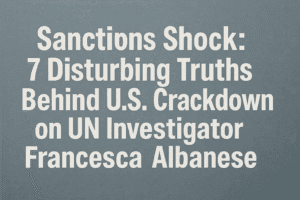Sanctions Shock: 7 Disturbing Truths Behind U.S. Crackdown on UN Investigator Francesca Albanese
The U.S. sanctions against UN investigator Francesca Albanese represent a dangerous precedent: targeting an impartial human rights expert for documenting abuses in Gaza. This retaliatory move aims to silence scrutiny of Israel’s military campaign and shield corporate enablers identified in Albanese’s reports. By weaponizing economic penalties against a UN mandate holder, the U.S. undermines international accountability mechanisms it helped establish.
The sanctions directly obstruct efforts to expose weapons suppliers and financial actors profiting from Gaza’s devastation, while chilling independent documentation of civilian suffering. This escalation reflects a broader pattern of suppressing critics through diplomatic coercion rather than engaging with evidence. Ultimately, it prioritizes political protection over the principles of justice and transparency – leaving vulnerable populations without crucial witnesses to their reality. When powerful states punish truth-tellers, universal human rights frameworks lose all meaning.

Sanctions Shock: 7 Disturbing Truths Behind U.S. Crackdown on UN Investigator Francesca Albanese
The U.S. decision to sanction Francesca Albanese – the UN Special Rapporteur for Palestinian territories – marks a seismic shift in international diplomacy. It’s not merely a policy move; it’s an open declaration that scrutinizing allies carries tangible consequences. This transcends the Israel-Gaza war: it strikes at the heart of whether powerful nations can silence mechanisms designed to uphold universal human rights.
Why This Matters Beyond Headlines
- The Accountability Freeze
- Albanese’s work documents corporate ties to Gaza’s devastation (e.g., weapons suppliers, bulldozer manufacturers, financial enablers). Sanctioning her implicitly shields these entities from scrutiny. The message to global human rights defenders? Examine complicity at your peril.
- The Diplomatic Weaponization
The U.S. previously pressured the UN to remove Albanese. When that failed, sanctions became the tool of choice. This reflects a broader pattern: leveraging economic coercion to paralyze critics, as seen in earlier crackdowns on U.S. campus protests.
- The Genocide Debate’s Chilling Effect
Albanese’s use of “genocide” – fiercely denied by Israel/U.S. – isn’t rhetorical hyperbole. Her July 2025 report methodically links corporate profits to civilian destruction. Silencing her sidelines legally fraught terminology and the evidence underpinning it.
Key Irony: Undermining Institutions America Built
The U.S. helped create the modern human rights framework. Now, by sanctioning a UN investigator:
- It boycotts Human Rights Council sessions, then punishes officials for operating in that vacuum.
- It condemns ICC warrants against Israeli leaders while invoking “self-defense” rhetoric.
- It labels Albanese “antisemitic” – a tactic increasingly used to deflect policy criticism.
Human Rights Watch’s Liz Evenson nailed it:
“This isn’t about justice; it’s about silencing truth-tellers. The U.S. is dismantling norms survivors of abuse rely on.”
The Forgotten Human Lens
Behind the political theater:
- 57,000+ Palestinians dead (per Gaza Health Ministry), with hospitals collapsing.
- Albanese’s reports emphasize corporate profiteering from displacement – from bulldozers to banking.
- Sanctions ensure fewer voices left to document starvation, illegal settlements, or attacks on civilians.
What Comes Next?
- Global Solidarity Test: Will other nations condemn the sanctions or stay silent?
- Corporate Exposure: Albanese’s naming of companies (e.g., weapons, tech, finance firms) may fuel grassroots boycotts.
- The Credibility Toll: If investigators face retaliation for unpalatable findings, who replaces them?
The Unspoken Truth
This isn’t just about Israel or Gaza. It’s about whether accountability flows upward – to states and their allies – or only downward onto the powerless. When a UN investigator becomes a sanction target, the very concept of impartial justice trembles.
You must be logged in to post a comment.